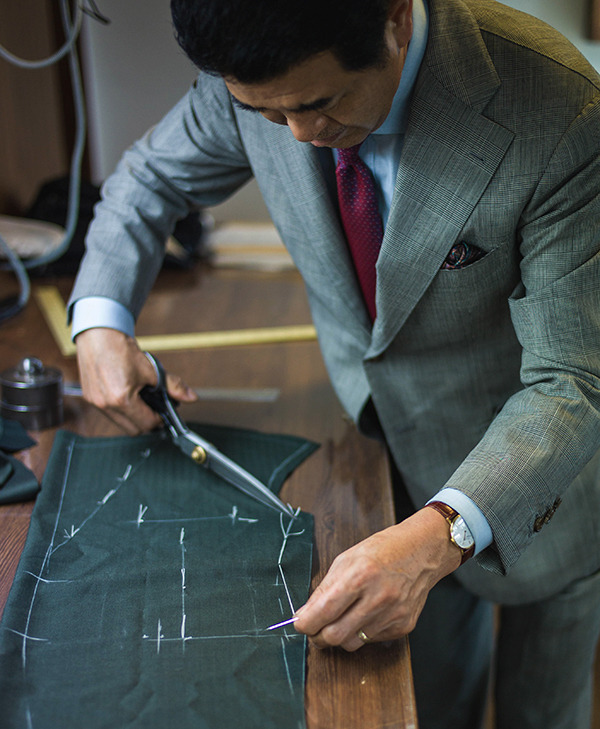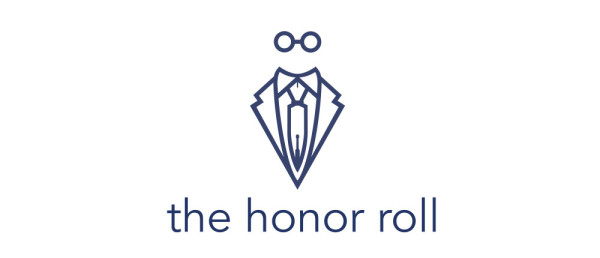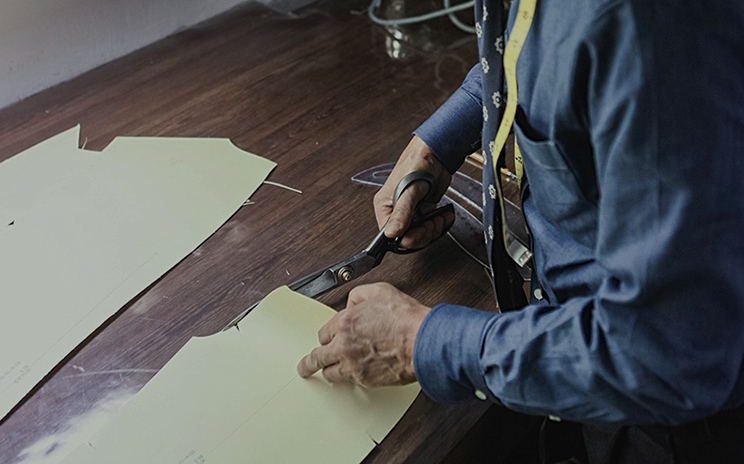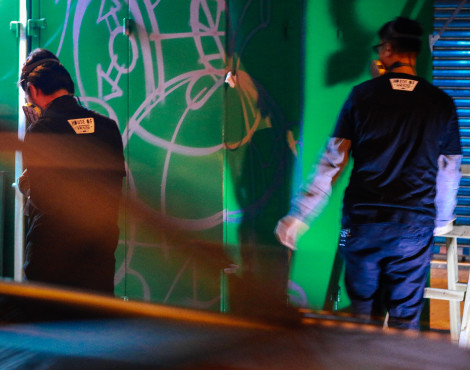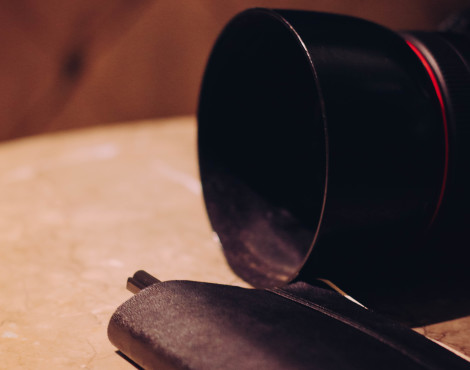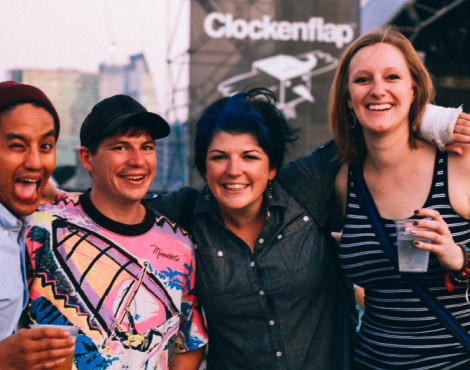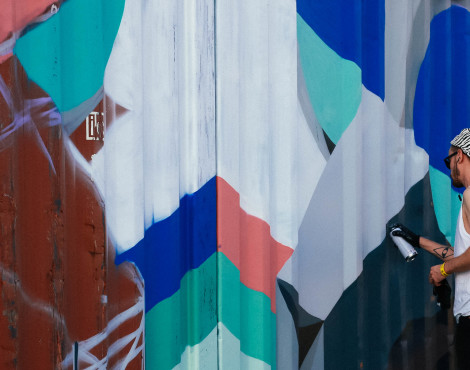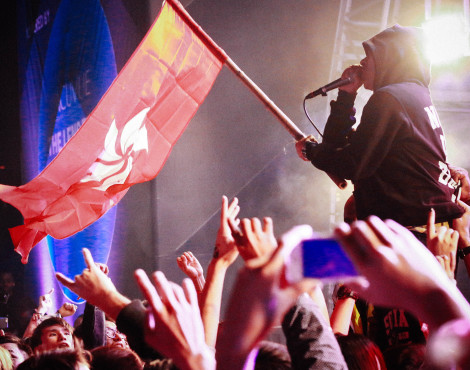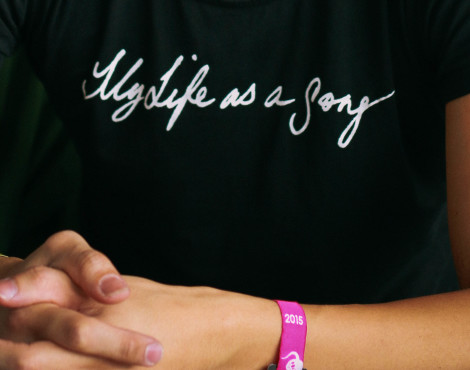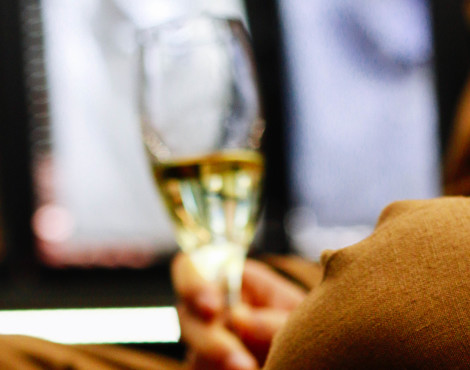At my age, the days of youthful independence are waning; new mothers and fathers among my friends wax endlessly about parenthood and the gifts it brings. Fatherhood has yet to call me to service, but I wait eagerly for it. And just as much, I worry if my children will ever listen to me. For as much as I love my own dad, I follow his advice as much as you’d trust your dog to file your taxes.
I met one exceptional example of successful fatherhood. Park Jungyul worked from the bottom of Korean tailoring to build Seoul’s leading tailoring house from the ground-up. Among its foundations are his two sons, Changwoo and Chanjin, who followed their father’s footsteps, while carvings sartorial paths of their own. The result is timeless and bold suits of flawless quality.
The Parks caught the attention of one Joe Ha, owner and proprietor of The Finery Company, a Sydney-based menswear collective showcasing suiting and accessory brands up to par with Joe’s own impeccable taste.
With an afternoon between generously timed trunkshow appointments in Hong Kong, Mr. Park, Chanjin, and Joe shared the importance of time, a commitment to God-given talents, and the secrets of a good family project.
This is B&Tailor.
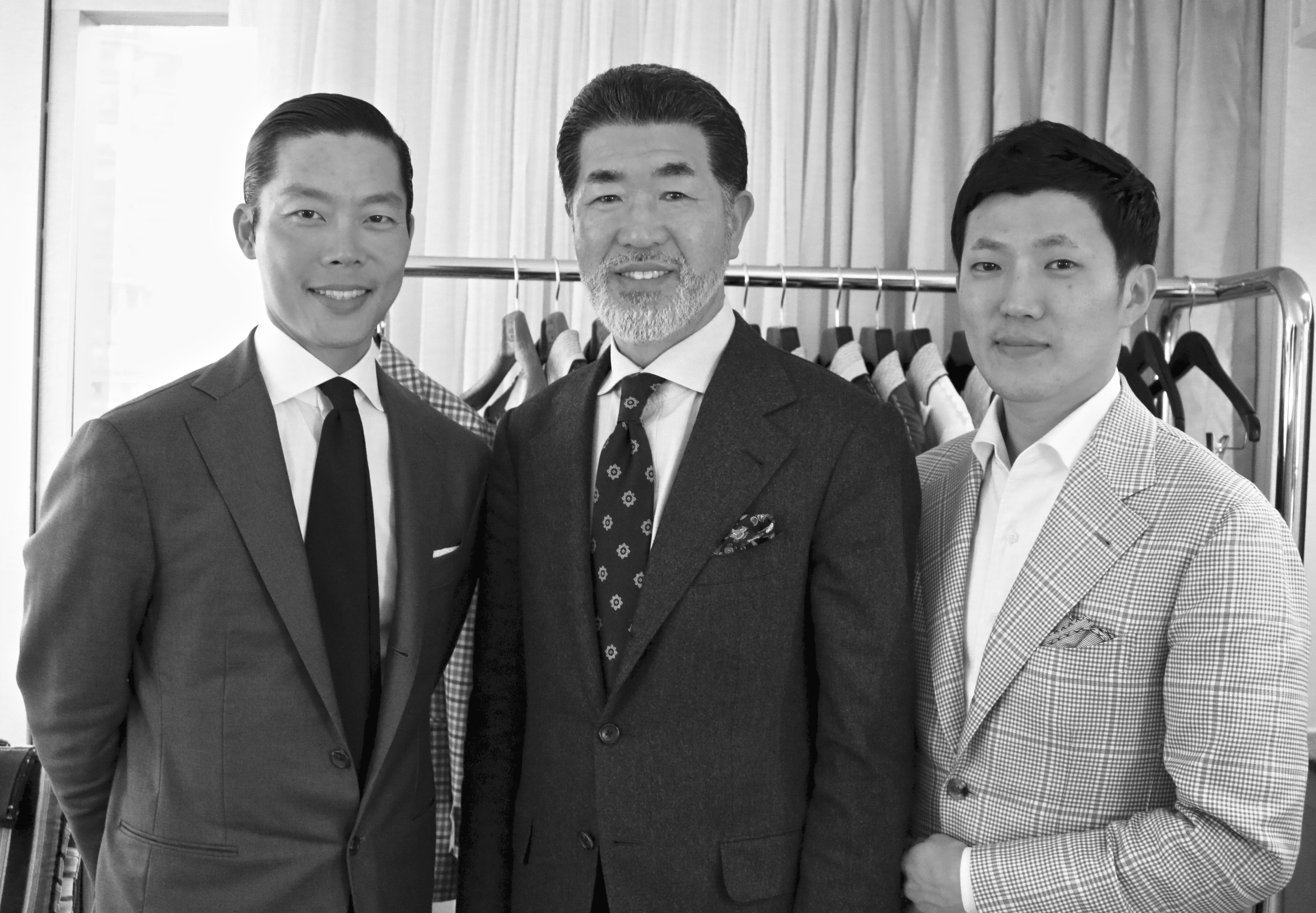
Chris Tuazon: I’ve done a lot of homework before our conversation, just as I expect my students to. One of your sons shared that you deliberately put Korean rooking atop your building to signify this is first and foremost a Korean tailoring house. You are the first Korean tailors I have met, so what would you say is the Korean approach to suiting?
Park Jungyul: I would say . . . as much handiwork as possible. We like to create a silhouette that’s more volumetric than flat, and this gives the suit life. Although no two physiques are same, there are points where we can balance things out for every individual—strike a harmony—and achieve a beautiful balance.
CT: So, this defines B&Tailor’s approach?
Joe Ha: These are the guidelines for their philosophy, which is to keep tailoring as natural, handcrafted, and high-quality as possible.
PJ: We’re seeing more and more foreign clients visit us in Korea. Many have visited Savile Row and Italy, where they typically experience a very quick fitting process. A lot of things that they say about B&Tailor is that how particularly meticulous we are with our fitting.
JH: B&Tailor makes a suit until they are fully satisfied. That’s the main difference in the way they do things.
On trunk shows like this, we never double-book anyone, and we always allow enough time in between. We don’t want to rush. There’s always as many chances to get something wrong as there are to get it right, so it’s important to take the time.
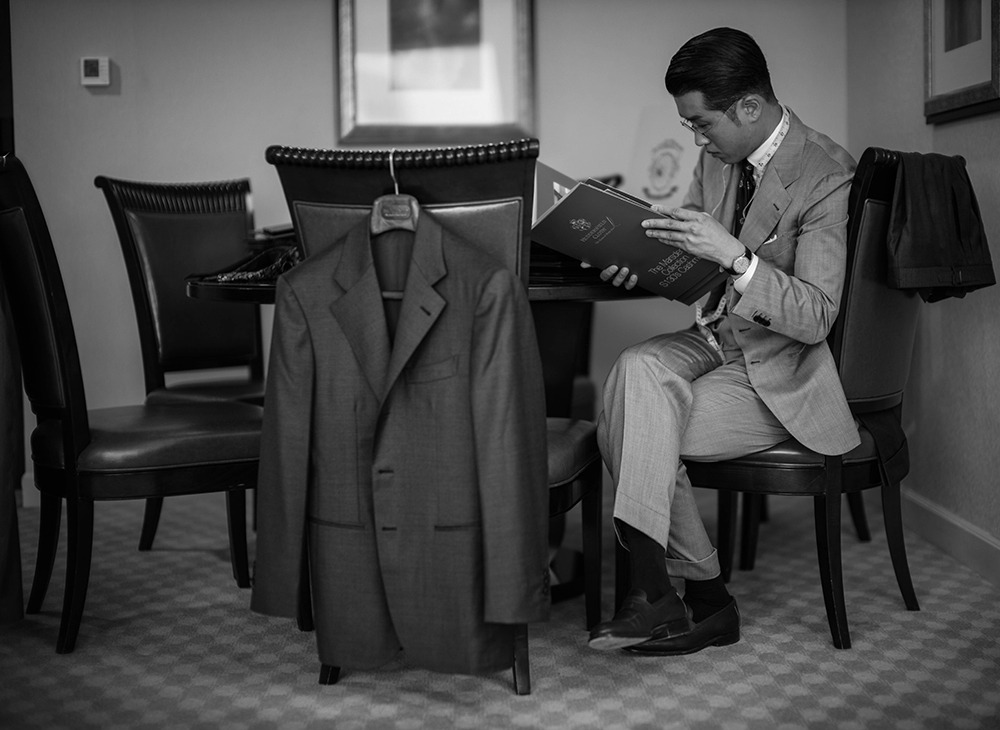
CT: Can you tell me how the Finery Company began this relationship with B&Tailor began?
JH: Over the last few years I commissioned many garments as a client, where I saw firsthand the Parks’ passion and workmanship. I was particularly impressed by their humble nature and their work ethic.
CT: So for choosing brands to collaborate with, the product is just as important as the people behind it?
JH: For me what is most important is the product that is unique, of highest quality and most importantly desirable. Then I must have a connection with people who make them. Their passion, ethic, personality and most importantly the ability to trust them whole-heartedly are the deciding factors. I must love the product and people behind it.
I approached the Parks with an idea to market their brand to the international scene and that’s the story. We have now become a good friends, a family.
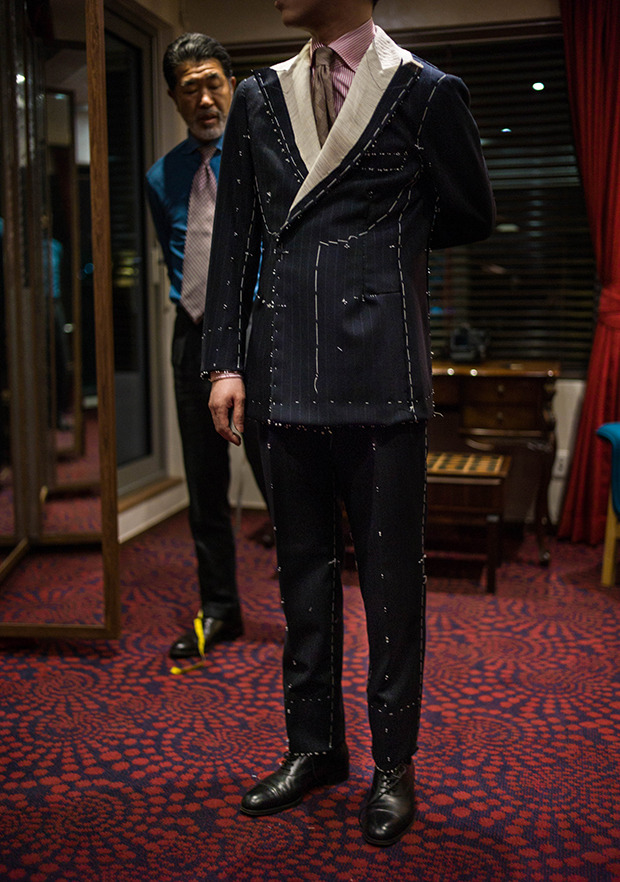
CT: One thing that’s fascinated me about your company is that it’s a father and son tailoring house. My experience with learning from my dad usually ends in butting heads and figuring it out myself. It’s great that you all share the art of making a suit. How do you do it?
PJ: A lot of people in Korea try to work with family members, and a lot of them fail, so many ask “How are you able to be successful with not only one, but two sons?”
The important thing is that we understand each other. It’s like old meets new. I myself have the technical knowledge to make a suit, but I’m behind the latest trends. That’s where my sons come in, as they are very good at seeing where trends are headed. Combine that with my heritage and tradition is how we collaborate.
Talent is God-given, and I’m so grateful that both sons are following my footsteps so we can work together in harmony.
I’m curious, what was you’re dad trying to teach you that made you so frustrated?
CT: Oh, well . . . my dad taught me how to swim, which was throwing me in the deep-end and watching me fight my way towards the wall, because I didn’t want to die. That’s been his teaching method. He wants to see me struggle, I think because he wanted me to value it. I appreciate it now, especially now I hunger for that struggle in everything new I learn.
PJ: That’s a good discipline he gave you!
CT: How was it like raising your sons in your tailoring house?
PJ: My eldest son, Changwoo, did not study fashion or tailoring, but has a natural eye for style, aesthetics, and trends. That is why he is in charge of marketing, promotion, and branding. Jean studied tailoring in Milan, so he’s been groomed to take over that side of the business. The two go hand in hand to uphold B&Tailor.
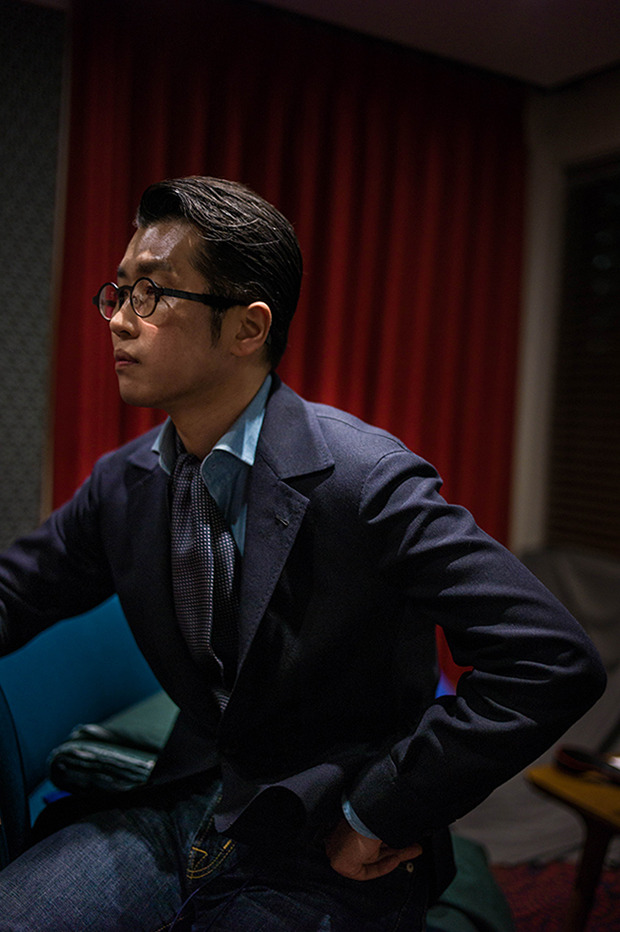
CT: How was it learning the Italian method after growing in your father’s approach?
Park Chanjin: Since it was a school, I learned a lot of theory. Whatever I learn from my father is quite different, as it is experiential knowledge. There are definitely differences in these tailoring methods, and I try to put these worlds together. Overall, though, I’ve learned so much more from my dad than from the school.
CT: Is there one thing you’ve learned from your dad that you think is very valuable in the art of tailoring?
PC: Speed. You basically have to work at it. You’re not born with fast hands. Anyone can do the job, but the speed at which varies from tailor to tailor. As much as he loves to take his time fitting a suit perfectly, he is very fast, neat, and accurate. Right now I’m trying to be like him.
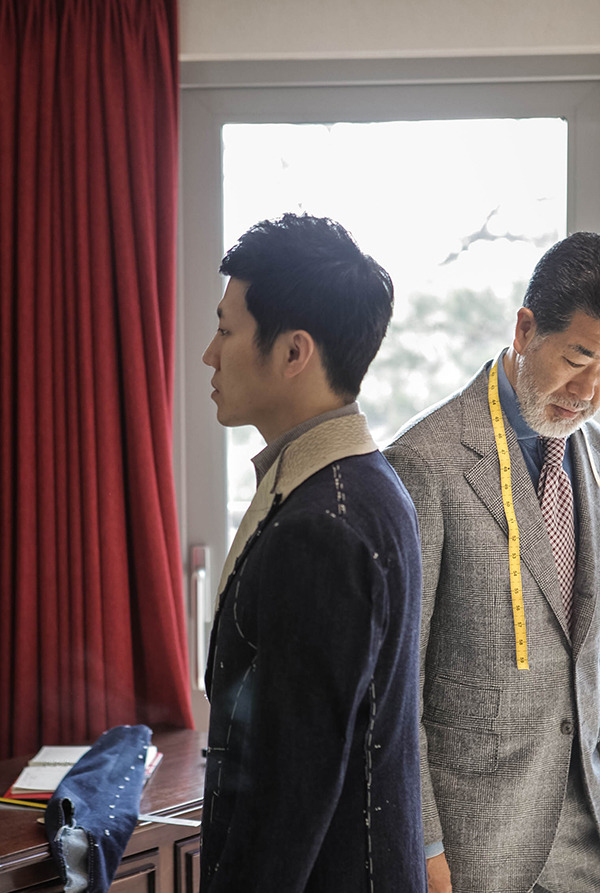
CT: I’ve read that B&Tailor focuses on two goals: create a flattering shape, and make the suit comfortable. How do you achieve this?
PJ: Good fabrics, and good internal structures and elements, such as canvasses. They play a big role. Depending on the type of internal structure we use, it could be very comfortable or very stiff.
JH: It comes down to choosing the right fabric with the right interlining. If you want a formal suit for such an occasion, you have to be willing to forego some of the comfort in order to achieve such a shape. But if you want a suit in which you could live all day, the balance must swing the other way.
PJ: You know, because of the difficulty of fitting a two-dimensional fabric around the contours of the three-dimensional body, there needs to be a lot of working into the fabric. We have to use an iron to stretch and shrink, but it must always be within the characteristics and limits of the particular fabric.
Therefore, whenever we receive new types of cloth, we always make clothes for ourselves first. We test it to learn its characteristics. Then can we apply these to our clients’ outfits.
CT: So there’s a lot of trial and error into discovering a fabric’s potential.
JH: Yes!
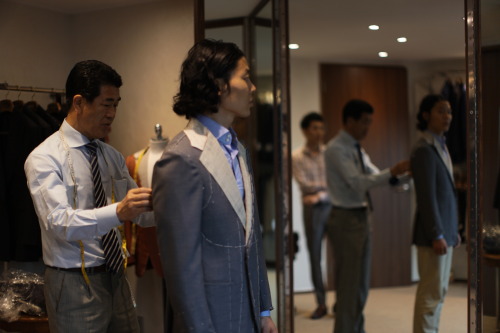
PJ: People tend to think that suits come in one design, such as a single house cut. But take the shoulder, for example. Consider the many traditional styles, and of course new ones emerging. The shoulder ultimately also determines the overall shape of the suit. So we try to use different designs on ourselves first before offering them to clients.
PJ: Nobody’s perfect, and there’s always room for improvement. My technique can and will always develop.
CT: It’s become clear to me that there is a definite passion to what you do.
JH: Actually, his name in Korean ( ) is two words. In opposite sequence, these characters mean “passion.”
CT: Where does this passion for making suits come from?
PC: It’s something that I took after I dad and tried to emulate.
JH: You know what, this is my own belief: of course you can direct your passion towards certain things at-will, but it can also be natural. I don’t need to think about committing to The Finery Company. It’s not for money, reputation, or popularity. It’s love.
PJ: The reason I believe so passionately in tailoring came from childhood:
I didn’t go to middle school, and during those three years I worked with my grandmother on her farm. She made me do backbreaking labor, day in, day out. At the time I absolutely hated her for making me work so hard! But now I’m so thankful for her training. Because of my grandmother, I’m able to put so much effort and passion into tailoring, and work as hard as I do. And all this by the grace of God.
JH: Trust me, Mr. Park is a hard worker. He starts his day at 4:30am and works to ten in the evening, non-stop. Maybe he takes a ten-minute lunch break.
PJ: I just live to use the talent God has given us in the best possible way, whether in my grandmother’s field or this one.
